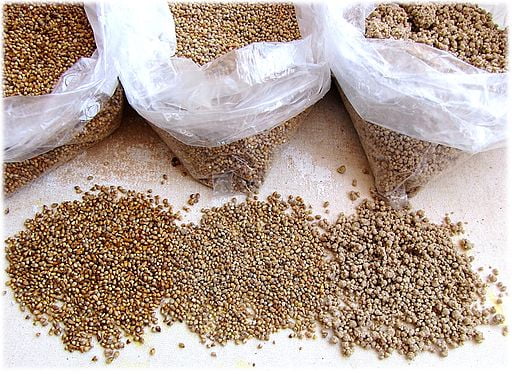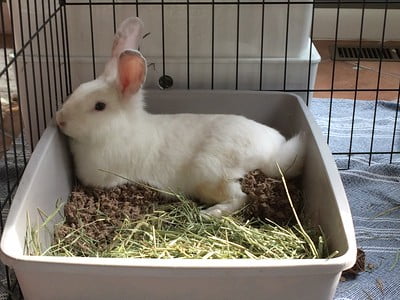Last Updated on March 1, 2023 by Marjon Ramos
You can safely leave your rabbits alone for 24 hours given that they have enough food and water for the duration. Longer than that, you should have someone check on your rabbit every 12 hours to make sure they’re alright and have enough food and water.
If you’re planning on going on a vacation, consider having a friend or relative take care of your rabbit or boarding it with your veterinarian.
Now that I’ve given you the gist of the article, read on as I explain in more detail how long a rabbit can be left alone:
Table of Contents
How long can you leave a rabbit alone?
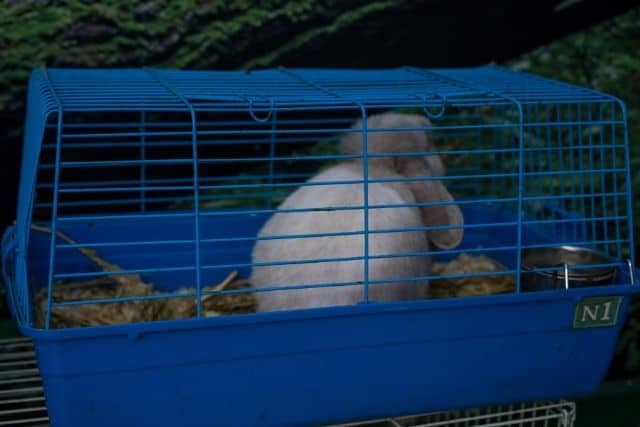
Leaving a rabbit alone for more than 24 hours could lead to your rabbit developing depression or getting stressed out. Depressed and stressed rabbits will have a decreased appetite and that could lead to them not eating enough fiber.
That in turn could lead to dangerous digestive issues like GI stasis.
If you’re a person who’s not home for long periods of time, consider getting another rabbit. Two rabbits could keep each other company while you’re gone, given that they have enough food and water for the duration.
Can rabbits be left alone for 8 hours?
Yes, rabbits can be left alone for 8 hours. Just make sure that they have enough food and water to last for 8 hours.
I myself, who have two rabbits, would leave them for 8–10 hours a day while I’m working.
What I did was buy them a huge hay rack and provide them with 2 water bowls. That’s more than enough for them to last a day.
Can bunnies be left alone for 2 days?
No, rabbits can’t be left alone for 2 days. Rabbits are social creatures and need constant attention in order to be happy.
Leaving a rabbit for more than 24 hours would make most rabbits depressed, especially those who don’t have a rabbit companion.
Always ask a friend or relative to look out for your rabbit if you are planning on leaving for more than 24 hours. You could also board your rabbit with a veterinarian for the duration.
Can rabbits be left alone for a week?
No, rabbits can’t be left for a week. If you’re planning on going on a vacation, you’ll need to find a friend or relative to take care of your rabbit.
You could also look for a pet sitter or board your rabbit with your veterinarian. Some shelters also offer pet sitting. Ask around your local animal shelters if they offer one.
Reasons why rabbits can’t be left alone for an extended period of time.
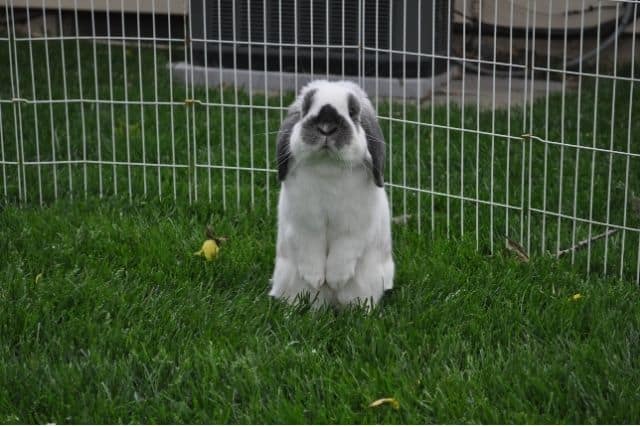
Rabbits are social creatures, and they require constant attention from either you, their owner, or another rabbit.
They also require exercise and other stimuli in order to not get frustrated and stressed.
Here are some of the reasons why rabbits can’t be left alone for more than 24 hours:
They need exercise.
Rabbits need constant exercise because they are not made to be kept in cages all day. Rabbit experts conclude that the best way to keep a rabbit healthy and happy is to mimic what they do in the wild.
Rabbits in the wild have the whole forest to explore and hop around all day.
You need to give your rabbit at least 4 hours of exercise each day.
Your rabbit would get depressed.
Rabbits that are left alone without a companion will increase the risk of depression. Depressed rabbits could become withdrawn and aggressive towards their owners.
Another dangerous symptom of depression in rabbits is a low appetite.
Low appetite in rabbits could lead to digestive distress because rabbits need to constantly eat in order to induce movement in their gut.
Your rabbit would become anxious.
Rabbits that are bonded with their owners will become anxious when left alone for too long.
Your rabbit would wonder if you left him/her permanently and if you’re ever coming back.
Things to prepare for when you’re planning on leaving your rabbit for a while or when you plan to go on a vacation.
If you’re planning on leaving for longer than 24 hours, here are some of the things you need to prepare for your rabbits:
1. Company
First and foremost, your rabbit needs someone to take care of them while you’re gone.
Here are some of the options you can do:
Hire a pet sitter
Hiring a pet sitter to take care of your rabbit could be a neighbor or a friend. There are also services that offer rabbit sitting.
What pet sitters would usually do is play with your rabbit while you are gone and make sure that they have enough food and water.
Board your rabbit to a veterinarian.

Boarding a rabbit to a veterinarian is also a great option. They would provide the food for your rabbit and give your rabbit playtime. You could also provide the vet with your own food to reduce the cost.
Ask your friend or relative to check on your rabbit.
The cheapest option is to ask a friend or relative to check in on your rabbit daily while you’re gone. Just provide enough food for your friend or relative to feed your bunnies.
You could also leave instructions on how much food to give, when to give treats, if your rabbit has medical conditions, etc.
It’s also a good idea to leave the phone number of your rabbit’s veterinarian in case something is wrong.
2. Food and water

Make sure that your rabbit has enough food to last for the duration of your vacation. This would make it easier for your chosen companion to feed them.
Also, provide your pet sitter with the usual portions of your rabbit’s food. Suddenly changing the portion of your rabbit’s food could lead to digestive distress.
3. Toys
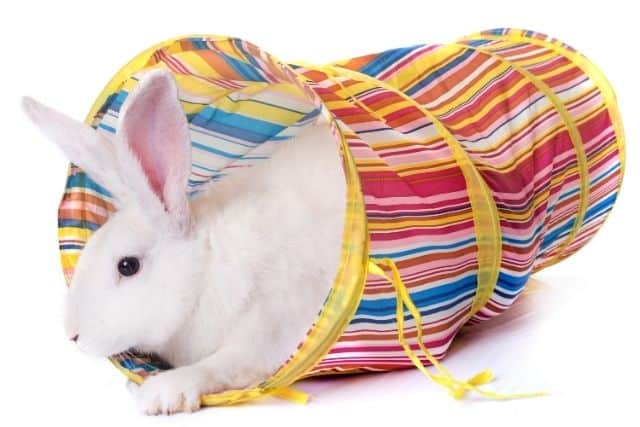
You should also provide some toys for your rabbit to keep them busy while you or their companion is gone.
This would help alleviate their boredom and keep them stimulated while you’re gone.
The best toys for rabbits are:
- Willow balls
- Willow bridge
- Willow sticks
- Wooden dumbbells
- Twig Tunnels
- Ka-Bob’s Chew Dispenser Toy
- Toilet paper rolls
4. Clean their cage.
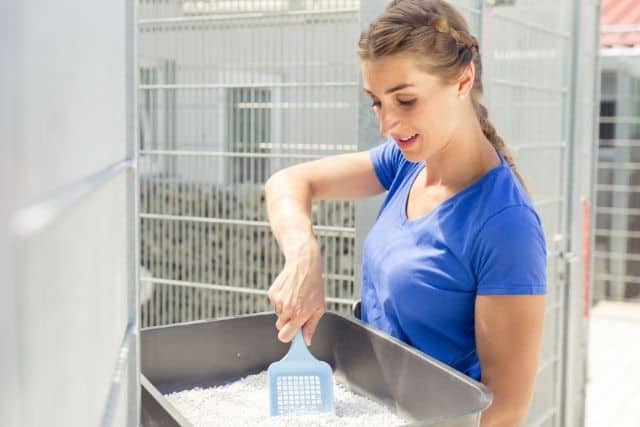
You should also clean their cage before your vacation. Remember, rabbits poop and pee a lot.
Rabbits that are 1.1–3.5 pounds would produce < 133 grams of manure per day. For medium breed or 6–10 pound rabbits, they would produce 220–450 grams of manure per day. While large-breed or 9–12 pound rabbits could produce > 1000 grams of poop pellets per day.
Rabbits are meticulous cleaners and like to keep their territory clean and organized. Without you to clean up after them, their cage/hutch would be hard to live in after a couple of days.
5. Make sure they’re safe.
Make sure that your rabbit’s environment is safe from any predators or other dangers, like wires they could chew.
You should also remove any health risks a rabbit might reach and eat while you’re gone. Give specific instructions to your pet sitter on what the possible dangers are that your rabbit might do.
Conclusion
Never leave your rabbit alone for more than 24 hours, especially if you don’t have another rabbit as a companion.
Rabbits are social creatures, and they need constant attention in order to be happy. Rabbits that are left alone for long periods of time would often get depressed and stressed.
Depressed rabbits could develop symptoms like decreased appetite. Which in turn could lead to digestive distress because rabbits need to constantly eat to induce movement in their gut.
If you’re planning on leaving your rabbit alone for more than 24 hours, get a pet sitter or board your rabbit to a veterinarian. Just make sure that they have enough food and water for the duration that you’re gone.
Cite this article:
Related Articles
- Can Rabbits Eat Asparagus? 9 things you need to know.
- Can Rabbits Eat Tomatoes? What You Need To Know.
- Can Rabbits Eat Watermelon? What You Need To Know.
- Can Rabbits Eat Grapes? What You Need To Know.
- Can Rabbits Eat Broccoli? What You Need To Know.
- Can Rabbits Eat Apples? What You Need To Know.
- Can Rabbits Eat Cabbages? What You Need To Know.
- Can Rabbits Eat Strawberries? What You Need To Know.
- Can Rabbits Eat Bananas? What You Need To Know.
- Can Rabbits Eat Oranges? 9 things you need to know.
- Can Rabbits Eat Blueberries? Here’s Why.
- Can Rabbits Eat Spinach? Your Questions Answered.
- Can Rabbits Eat Cucumbers? Here’s Why.
- Can Rabbits Eat Celery? What you need to know.
- Can Rabbits Eat Radishes: Everything You Need To Know
Sources and further reading
- Buseth, Marit Emilie., and Richard A. Saunders. Rabbit Behaviour, Health, and Care. CABI, 2014.
- Lebas, F. The Rabbit: Husbandry, Health, and Production. Food and Agriculture Organization of the United Nations, 1997.
- Patry, Karen, et al. The Rabbit-Raising Problem Solver: Your Questions Answered about Housing, Feeding, Behavior, Health Care, Breeding, and Kindling. Storey Publishing, 2014.

